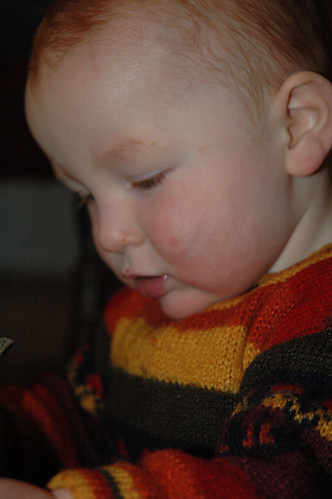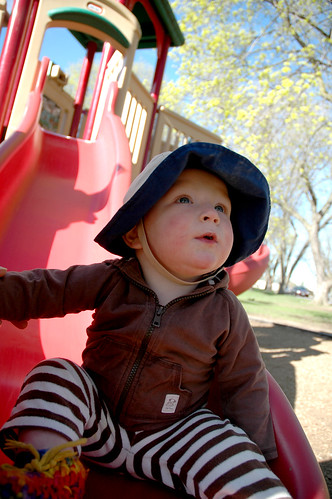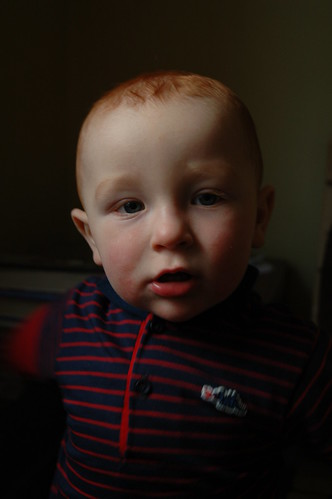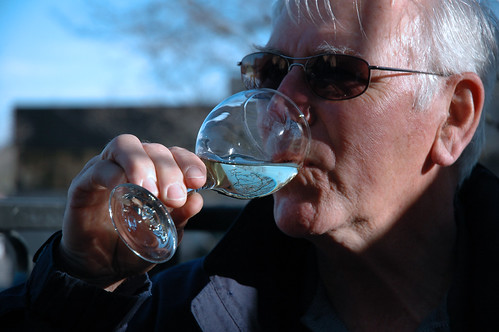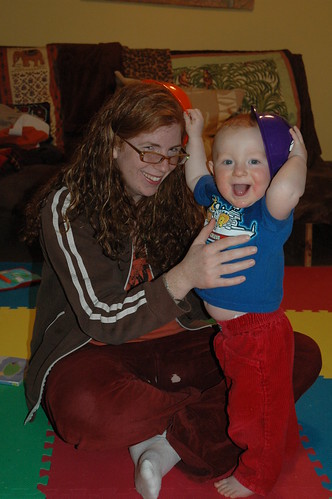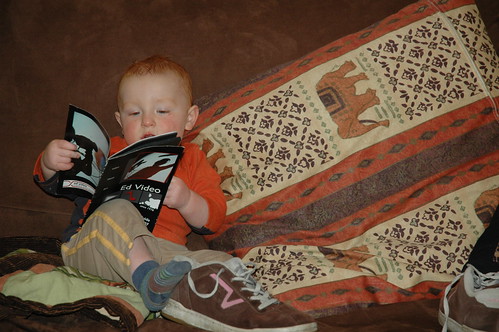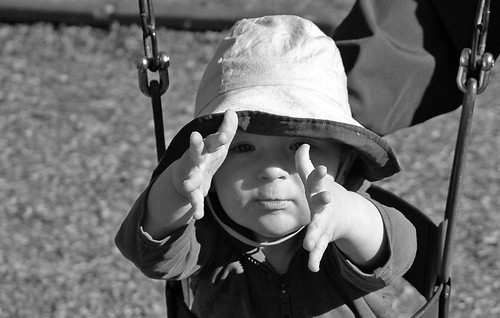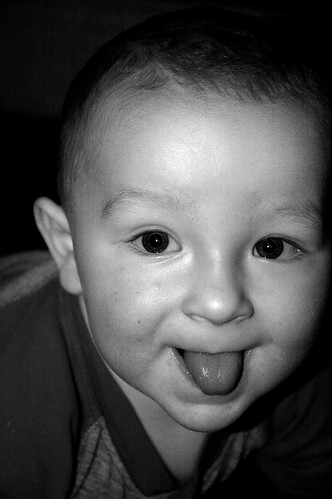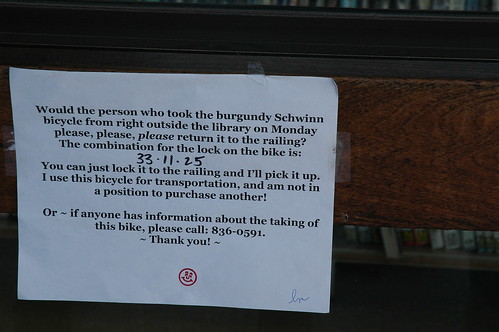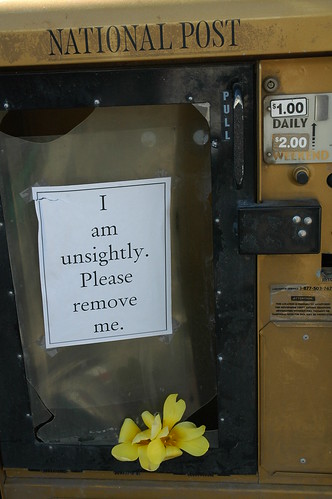I’m pissed. Partly at myself, and partly at the fucking doctor at the walk-in clinic we brought Swee’pea to on Friday night. I alluded to this stuff in my earlier post where I focused on whining about how I was going crazy, and now I will treat you to a far fuller discussion of it than you could possibly want.
But first, some long and involved preamble.
I have long considered myself a pretty educated, critical consumer of health care. It helps that I have found myself suffering ill health and the medical profession could offer me no help and no answers. It does a lot to shake your faith in god-like medicine to discover that it is neither omniscient nor omnipotent. It helps that I was forced to take responsibility for my own health and do my own research, and that I found wellness in a more naturopathic, holistic approach.
Navigating the sea of conflicting health research and propaganda we all swim in (not to mention overburdened doctors, and a failing health care system) I have come to trust my instincts. I make my decisions based on what makes sense to me, what seems logical, and what seems to carry the least risk. I read the latest sensationalized medical studies with a critical eye and question their correlations and conclusions (if I get around to reading them, that is).
When I was pregnant, I continued to take responsibility for my own health decisions (which of course contained the health of my anonymous bump), with the help of midwives. I tried a prenatal vitamin but it gave me such gut-rot all I wanted to eat was buttered toast, which I didn’t think was conducive to meeting a pregnant body’s increased nutritional needs. I kept up my B-50 complex (which includes folic acid), because I saw on the prenatal vitamin that it was mostly B-vitamins and iron. I didn’t take additional iron supplements but tried to eat iron-rich foods like dried apricots and spinach, both raw and cooked, and others. In my reading, I discovered that the absorption rate of supplemental iron is questionable. I also read somewhere that your body can also adjust how much iron it absorbs from food and when it is exposed to a diet high in iron it actually absorbs a smaller percentage of iron than it does with a diet low in iron; during pregnancy, your absorption of iron also increases. So I trusted my cravings and my belief that in general a varied and healthful diet should be able to meet a person’s nutritional needs.
Around week 32, the midwives tested my blood and discovered that my iron level was borderline. I decided to take an iron supplement that was reportedly gentler on my stomach (I think it was called Palaver or something, and it didn't cause me any distress) and continue eating iron rich foods. What interested me was that they drew the blood before Christmas, but I didn’t get the results until we were into January. While I was visiting my parents over Christmas, I suddenly really wanted some of the sausage my dad was barbecuing, the first time I’d ever wanted red meat in years. So I went with the craving and ate half a sausage, slightly afraid that any more than that would make me feel sick. I was quite pleased to discover after the fact that my haemoglobin had been low when I experienced that craving. Anyways, by the time they took my blood for the c-section, my haemoglobin was back up to a healthy level.
I’m getting all tangential though when the point I really want to make is that I have a pretty high level of confidence in my ability to take responsibility for my own health, and that this confidence continued in large part while I was pregnant.
But that all changed when Swee’pea was born. Maybe it started with the medicalized labour and necessarily surgical birth, or maybe with our positive hospital experience, much to my surprise. Or maybe it started before that when I chose to get the rhogam shot around 28 weeks, even though it creeped me out to get someone else’s blood bits put inside me, for the sake of not even the baby I was carrying then but for some maybe baby out there in the future.
But really, I think it started when I finally got to hold my pink little baby and inspect him from his old soul eyes to his long skinny toes and contemplate his perfection. Or, not so much his perfection, as his rightness. I know we all say it so much that it’s become a cliché but even now, 15 months on, I still occasionally marvel at his magic. At the risk of being vomitously cheesy, I am still in awe that we have been graced with his miraculous presence, not miraculous because of odds that were overcome or because he survived a distressing labour but out of a new understanding of the miracle of life. Oh yeah, and how ill-equipped I felt for caring for him. I remember the nurse bringing him in after he’d been in the nursery for five hours and she said, “He’s hungry and he’s all yours.” I remember thinking that there was something really wrong in that, handing off a hungry baby to a total greenhorn and just leaving us. Alone with him. I mean, exactly what were we supposed to do with him?
Anyways… faced with the enormous task of keeping alive this most precious being ever to come upon this earth was, and sometimes still is, a little overwhelming. I felt completely unprepared.
Take the question of vaccination. I started to do research on the subject when I was pregnant, which was even then a nightmare. The governments say that reports of autism associated with the MMR vaccine are a myth and have been disproven. They say that vaccines are safe and have very few serious complications, that the few complications that may arise vastly outweigh the consequences of the disease. But I could never find actual numbers to back that up. I couldn’t anywhere see risks of the vaccine put next to risks of the disease.
On the flip side, the anti-vaccination faction seems to use a lot of emotional language that minimizes the risks of the diseases themselves and first-hand reports from parents whose children were affected or killed by very serious complications of vaccines. I still couldn’t find any numbers, which I think may have made me feel more comfortable. How many kids die or have brain damage from vaccines vs. those catastrophic effects from the disease?
And besides, it’s all fine and dandy to crunch numbers (or try to) and weigh risks and benefits when you’re dealing with a creature you’ve only seen in black and white outlines; it’s quite another to try to take that approach when you are talking about the most amazing, most precious, most beautiful thing you have ever laid eyes on. Even if the risks are 1 in 100 billion, the possibility that YOUR precious could be The One is impossible to contemplate.
In the end, we just decided that we had to put our trust in our paediatrician, and hope for the best. She is very much in favour of vaccines. At times, her arguments feel like they veer towards fear mongering, but since I can’t find the information I would need to make a truly informed decision, we go with her risk assessment.
I have found myself taking Swee’pea to the doctor at the drop of a hat, seeking reassurance that he isn’t dying, that I’m not going to miss an important clue that he needs immediate care, that he is ok. This craving for a doctor’s reassurance has lessened somewhat since he’s gotten bigger and better able to communicate. But I still find myself trusting doctors in a way I don’t think I would for myself. Of course, I can feel my own symptoms and judge their severity. With Swee’pea, he’s not an effective enough communicator to describe the intricacies of his symptoms and severity, so I have to guess from his behaviour and whatever information I can gather in the form of temperatures, wet diapers, and the like. I suspect that awareness that I can never really know for sure what Swee’pea is going through is where I trip up.
So… Friday night Swee’pea’s fever rose higher than he’s ever had (he hasn’t had many fevers, never for more than a few hours and never very high so it’s not really saying that much), so we took him to the walk-in clinic. I’d thought about taking him to our normal doctor’s but he’d seemed fine in the morning, and she takes Friday afternoons off, so I figured we’d just wait and see. By 8, I didn’t want to wait anymore and risk a trip to the ER at 2 am.
The clinic doctor checked out his ears and said his left ear was infected. I asked how he could tell so quickly and he said he saw red and that’s why they pay him the big bucks. He prescribed us an antibiotic, looked up the dosage in a big fat drug compendium and we duly filled it at the late night pharmacy.
Alarm bells did ring when the doctor said, as he ran his finger over the small print of the compendium, “I THINK [your pediatrician] is ok with me prescribing this drug.”
With hindsight, I should have asked why. I should have advocated that if there is something contentious about this drug, perhaps we should play it safe and choose a different one. I almost did, but then I chickened out, figuring he knew best.
By Sunday night, Swee’pea’s fever had broken, which led me to believe that the antibiotics were working, but he’d also developed a blotchy face and pinkening spots along his back, so I suspected perhaps a reaction to the antibiotics. On the advice of the pharmacist, we didn’t give Swee’pea any medicine that night and the next morning I took him to his doctor.
She shook her head as soon as I mentioned that the other doctor had prescribed azithromycin. She checked his ears and pronounced them perfect, and that if he had had an ear infection, they couldn’t look this good; it was way too soon. Apparently, children’s ears go red when they have a fever.
Not only was Swee’pea misdiagnosed, but the antibiotic he prescribed was like using a bulldozer to pick up a few grains of sand. Our paediatrician says it's the worst culprit for antibiotic resistance.
Why would a doctor prescribe an antibiotic that is known to be such a contributor to resistance? That doesn’t seem like prudent use at all. Our doctor didn’t know but she hypothesized that perhaps it was because it only takes a 3-day dose and hangs around in the system for a long time afterwards, so there’s more likelihood of completing the course.
So now instead of just being pissed off about Swee’pea getting misdiagnosed and unnecessary antibiotics, I am indignant too.
I’m educated. I know the risk of antibiotic resistance and would always finish a course of antibiotics. I never use antibiotic soaps because they contribute to antibiotic resistance and aren’t any more effective than proper use of regular old soaps anyways. After the SARS outbreak, the property manager at my workplace switched all the bathrooms’ dispensers to antibacterial soaps. I lobbied, unsuccessfully, to just stick to regular soap, especially since SARS was caused by a VIRUS -- not BACTERIA -- and therefore could not be killed by antibacterial soap. It still bothers me that I couldn’t make the slightest dent in that cause.
Anyways.
I have learned from this experience. Doctors are not gods. I cannot put all my trust in them for the survival of Swee’pea. I must trust those little alarm bells. There’s nothing wrong with questioning.
Ok, that's all... anyone still here?







